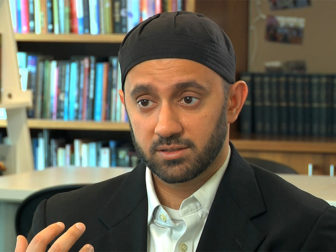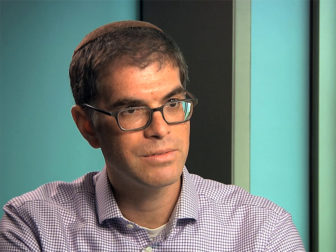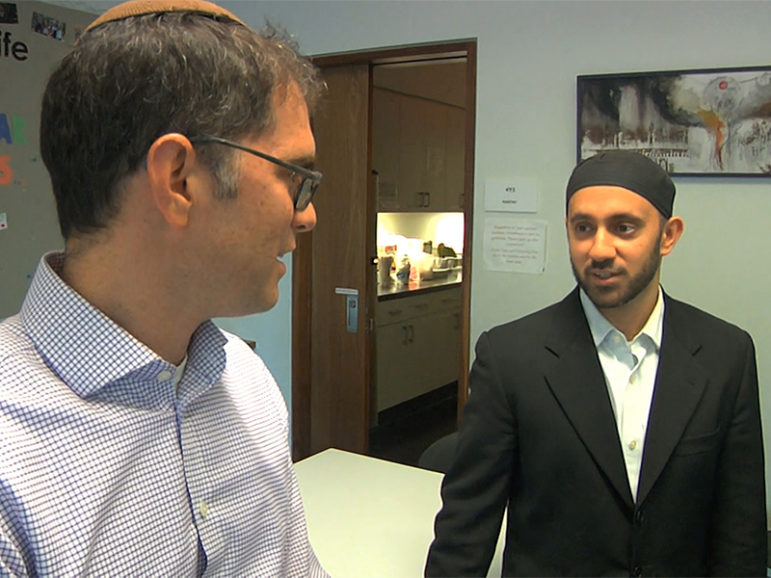NEW YORK (RNS) Like many Americans, New York University chaplains Imam Khalid Latif and Rabbi Yehuda Sarna remember exactly where they were on Sept. 11, 2001. Both men say that day and its aftermath were pivotal in defining what they now see as their lives’ mission: to promote a vision for interfaith engagement based on personal relationships.
Latif was a sophomore at NYU and had just arrived for Arabic class when a security guard told the students to evacuate. They went to nearby Washington Square Park, where thousands had gathered to watch the fire at the World Trade Center.

Imam Khalid Latif, chaplain at New York University. Photo courtesy of Religion & Ethics NewsWeekly
“People were trying to figure out what was going on, and all of the sudden we were hit by this very heavy silence as we watched the second plane fly into the towers,” he told the PBS program “Religion & Ethics NewsWeekly.” “It felt like an eternity but was really just seconds.”
Sarna was in rabbinical school at New York’s Yeshiva University. He was doing an internship at a Modern Orthodox synagogue in the Bronx, where the senior rabbi at the time, Avi Weiss, was known for his social activism. After the attacks, Weiss went to the Ground Zero area to see how he could help. He invited Sarna to go with him.
“I watched as he went over to the people who looked the most despondent, tired, grieving, and he just hugged them and said, ‘I’m here, I am a rabbi, and I’m just here to say God bless you,’” Sarna recalled. “That was the moment that I received my ordination. It’s about human connection.”
[ad number=“1”]
In the aftermath of the attacks, Latif and other Muslims were hit by a backlash of blame. Latif’s father urged him to stop covering his head so he couldn’t be visibly identified as a Muslim. Other Muslim friends shaved their beards or stopped wearing hijabs.
“I didn’t understand why, at a time when people had so many questions, many of us were taking steps back,” Latif said.
Amid the suspicions, Latif said he was buoyed by an outpouring of support from friends of other faiths. That encouraged him to begin speaking out about his Muslim beliefs, “to tell people, ‘This is what we believe in, this is who we are, this is what our values actually are,’” he said.
Latif became active in building new interfaith coalitions, especially among other students.
Today, he and Sarna are leaders at NYU’s Global Center for Academic and Spiritual Life, which has become a national model for university interfaith programs.
“Interfaith interaction today can’t be what many of us have done with it in the past, where it’s just a panel discussion, people getting up on a stage talking about similarities for an hour and then everybody goes back to their own homes,” Latif said.
Added Sarna: “We are concerned not about what’s said in the books, but what people are saying in the street, and therefore, the kind of engagement we are looking for is very much personal. Face to face.”
[ad number=“2”]
At NYU, there are several interfaith clubs to foster dialogue. Students are encouraged to attend each other’s religious services in projects such as the Muslim/Jewish “Jum’ah/Shabbat Experience.” Senior Sana Mayat, a Muslim, says the Jewish concept of Shabbat has enhanced her own Islamic practice.
“It’s a really beautiful thing to disconnect, tune everything out and really center yourself in what is important,” she said. “I pray five times a day, that’s five times a day that I’m supposed to tune everything out and really concentrate on prayer and God.”
There are also joint service projects, such as when students of different religious backgrounds came together to help rebuild homes after recent tornadoes.
“What we’ve found is those kinds of disasters just don’t knock down homes, but they can break down barriers and the experience of acting out on a shared value really bonds people,” Sarna said.
That was the experience of Jewish student Gavriella Rubin. “When you’re sitting and painting a wall for 10 hours, you’re going to talk to the person next to you,” she said. “You have a common goal and a common mission … and you just relate to people as people.”
Sarna and Latif live out their vision in their own close friendship. When Latif got married five years ago, it was on the Jewish Sabbath, so Sarna, who is an Orthodox Jew, walked more than 80 blocks to be there. Today, they live with their families in the same building.

Rabbi Yehuda Sarna, chaplain at New York University. Photo courtesy of Religion & Ethics NewsWeekly
“Our wives are friends, our children are friends. We at one point even shared a nanny,” Sarna said. “My children don’t know anything different.”
“I think my own relationship with God has been heavily impacted by his relationship with his faith and his relationship with God,” Latif said.
The two men believe having strong personal relationships makes it possible to confront controversial issues, such as religion and terrorism or the Israeli Palestinian conflict.
“We believe that difficult conversations are best had between friends,” Sarna said.
In their work, Latif and Sarna say the lessons of 9/11 are still every evident. Last year, during Pope Francis’ visit to the U.S., Latif helped lead the interfaith service at the 9/11 Memorial Museum, where he urged the audience to push past religious ignorance.
[ad number=“3”]
“Through our knowing of each other today, let us move beyond a mere toleration of our differences and work towards a much-needed celebration of them,” he told the group.
READ: At 9/11 site, pope prays with Muslims, Jews, Sikhs, Buddhists and Hindus
Fifteen years after 9/11, both leaders say they are concerned that divisions and anti-religious bigotry seem to be on the rise in many areas.
“There is a return of the kind of hateful rhetoric that we thought we had buried,” Sarna said. “It’s scary, but for me it’s more sad than scary.”
Still, he said the current climate has renewed their purpose of helping young people find a different way.
“For many it’s like, well, where do I start? And you know, your starting can just be with one other person,” Latif said. “You might not impact a million people or 10 million people but if you can bring good to just one individual, you can impact one heart. That could make all the difference.”
(A version of this story was first broadcast on the PBS television program “Religion & Ethics NewsWeekly.” Kim Lawton is the program’s managing editor.)





